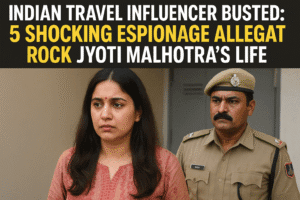Indian Travel Influencer Busted: 5 Shocking Espionage Allegations Rock Jyoti Malhotra’s Life
Indian travel influencer Jyoti Malhotra, known for her cultural exploration videos across India, Pakistan, and other countries, has been arrested on espionage charges linked to Pakistan. Authorities allege the Haryana-based YouTuber, with over 377,000 subscribers, shared sensitive information with a Pakistani diplomat expelled by India in May for “undiplomatic activities.” While her father denies the claims, asserting she traveled legally, police question her income sources funding global trips to destinations like Thailand and the UAE. Investigations also probe potential ties to a recent militant attack in Kashmir, though evidence remains undisclosed.
The arrest follows heightened India-Pakistan tensions, including cross-border strikes and tit-for-tat diplomat expulsions, underscoring longstanding distrust. Malhotra’s case highlights the blurred line between cultural diplomacy and national security risks, as her Pakistan-centric content—showcasing temples, markets, and diplomatic events—faces scrutiny. Critics argue the allegations risk conflating dialogue-building efforts with espionage, emphasizing the precarious role of influencers in geopolitically volatile regions. The outcome could set precedents for how social media creators navigate cross-border engagement amid intelligence concerns.

Indian Travel Influencer Busted: 5 Shocking Espionage Allegations Rock Jyoti Malhotra’s Life
In a case that underscores the fragile ties between India and Pakistan, Indian authorities have arrested travel YouTuber Jyoti Malhotra, accusing her of espionage activities on behalf of Pakistan. The 32-year-old influencer, known for documenting global adventures and cultural exchanges, now faces charges of sharing sensitive information with Pakistani intelligence operatives—a claim her family vehemently denies.
Who Is Jyoti Malhotra?
With 377,000 YouTube subscribers and 133,000 Instagram followers, Malhotra built a brand around exploring religious sites, bustling markets, and offbeat destinations. Her content often highlighted cross-border connections, including visits to Hindu and Sikh temples in Pakistan. Describing herself as a “modern girl with old ideas,” she positioned her travels as bridges between cultures. However, her frequent trips to Pakistan—reportedly funded by sponsored tours—drew scrutiny.
The Allegations
Haryana police allege Malhotra maintained contact with Ahsan-ur-Rahim, a Pakistan High Commission official expelled from India on May 13 for “activities incompatible with diplomatic norms.” Authorities claim their relationship began in 2023 when she sought a visa for Pakistan. Investigators are probing her financial records, questioning how she financed global travel to countries like China, Thailand, and the UAE without a clear income source.
A more serious charge links Malhotra to the May 7 Pahalgam attack in Kashmir, where militants targeted tourists. While police cite “leads” connecting her to the incident, no concrete evidence has been disclosed. Her father, Rajendra Malhotra, insists she acquired proper permissions for all trips and had “no access to defense secrets.”
Diplomatic Tensions and Espionage Trends
The arrest follows a familiar pattern of tit-for-tat expulsions between India and Pakistan. After India expelled Rahim, Pakistan retaliated by ousting an Indian embassy staffer in Islamabad. Such actions reflect decades of mutual distrust, exacerbated by recent clashes. Earlier in May, India conducted airstrikes on alleged militant camps in Pakistan, prompting cross-border skirmishes. While a ceasefire was announced on May 10, the U.S. government’s role in brokering it remains unclear, given the reference to former President Trump—a potential error in the original report.
Espionage arrests are routine in both nations. In 2023, India detained a man for sharing military data via WhatsApp, while Pakistan sentenced an Indian citizen to death for spying in 2017. Malhotra’s case stands out due to her social media presence, raising questions about how influencers’ access and visibility might be exploited.
The Human Angle
Malhotra’s videos from Pakistan, including a Ramadan dinner at the High Commission, showcased warmth between locals and an Indian visitor. Supporters argue her work promoted dialogue, not subterfuge. Critics, however, see red flags in her diplomatic contacts and unexplained income.
What’s Next?
Authorities are investigating potential collaborators, including other influencers. While Malhotra lacks direct ties to defense networks, the case highlights how non-traditional actors might be targeted in intelligence operations.
For now, the allegations remain unproven. But the incident underscores a harsh reality: in regions fraught with geopolitical strife, even cultural ambassadors risk becoming collateral damage.
Why This Matters
- Influencers in Crosshairs: The case tests the boundaries between legitimate cultural exchange and national security risks.
- India-Pakistan Relations: Ongoing tensions ensure that even minor incidents can escalate diplomatically.
- Transparency Concerns: With limited evidence publicized, the arrest sparks debates over privacy and due process.
As the investigation unfolds, Malhotra’s story serves as a cautionary tale about the intersection of social media, politics, and espionage in one of the world’s most volatile regions.
You must be logged in to post a comment.